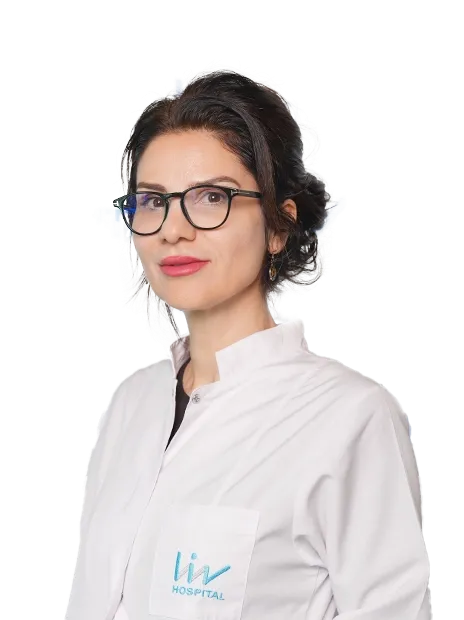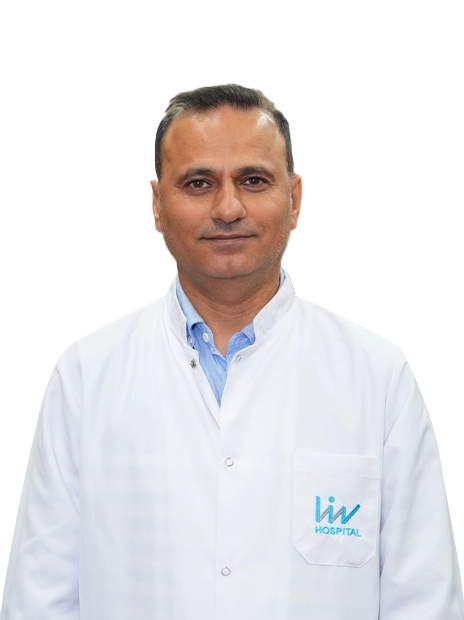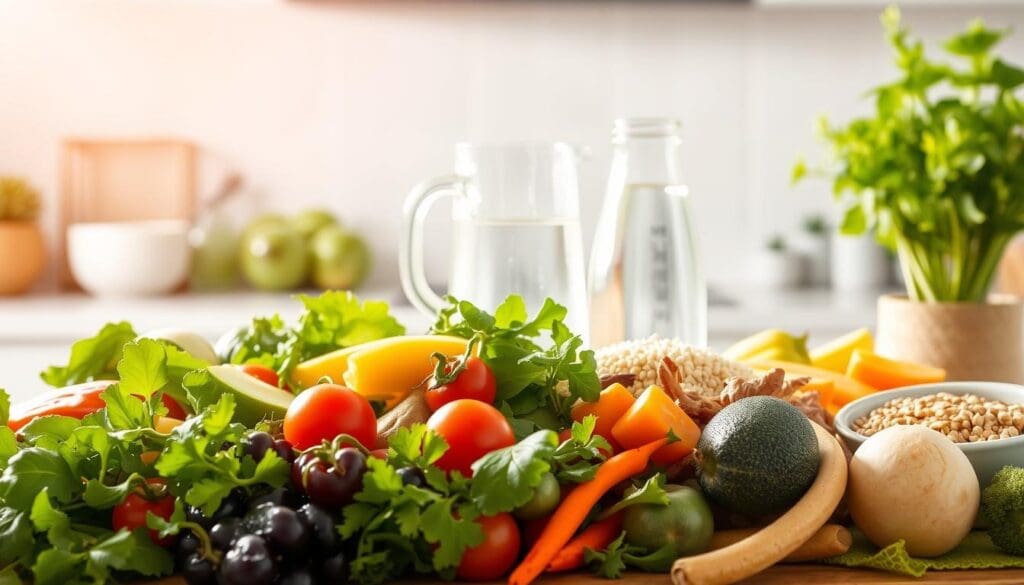
Keeping a healthy gallbladder diet is key for those with gallbladder problems. Eating the right nutritious foods and staying away from bad ones can lower gallbladder pain risks. This helps avoid serious complications too.
At LivHospital, we stress the need for a balanced diet. It should include fiber-rich fruits, veggies, whole grains, and lean proteins like chicken, fish, and legumes. Steer clear of high-fat, fried, and processed foods to avoid with gallbladder issues. This helps manage pain and boosts your gut health.
Making smart food choices can reduce gallbladder attack risks. It also boosts your gallbladder nutrition. We’ll look at key diet changes for better gallbladder health.
Key Takeaways
- Eat a balanced diet rich in fiber-rich fruits, vegetables, whole grains, and lean proteins.
- Avoid high-fat, fried, and processed foods to manage gallbladder pain.
- Strengthen your gut microbiome with a healthy gallbladder diet.
- Make informed dietary choices to lower the risk of gallbladder attacks.
- Improve overall gallbladder nutrition with the right foods.
Understanding Your Gallbladder and Its Dietary Needs
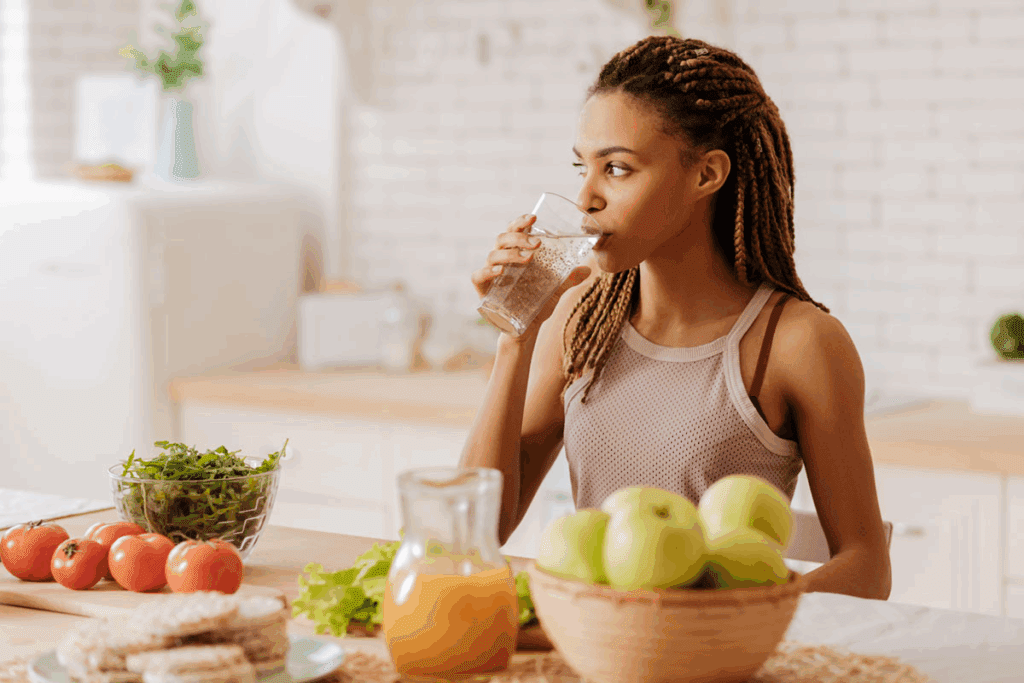
To keep your gallbladder healthy, it’s important to know its role in digestion. Your gallbladder is a small, pear-shaped organ under your liver. It plays a big part in how your body digests food.
The Role of Your Gallbladder in Digestion
The gallbladder stores bile from your liver. It releases this bile into your small intestine to break down fats. This is key for absorbing vitamins A, D, E, and K, which are fat-soluble.
When you eat, your gallbladder contracts to send bile into your small intestine. This bile makes fats easier for your body to digest. So, your gallbladder is essential for digesting fats and absorbing nutrients.
How Diet Affects Gallbladder Function
Your diet greatly affects your gallbladder’s health. Eating too much saturated fat and cholesterol can lead to gallstones. Gallstones are hard deposits that can block your gallbladder.
Eating foods high in fiber can help prevent gallstones. It does this by improving your bile’s quality and lowering cholesterol. A diet low in saturated fats and high in fiber is best for your gallbladder. Foods like fatty fish, which are rich in omega-3 fatty acids, can also help reduce inflammation and support your gallbladder’s function.
The Connection Between Diet and Gallbladder Health
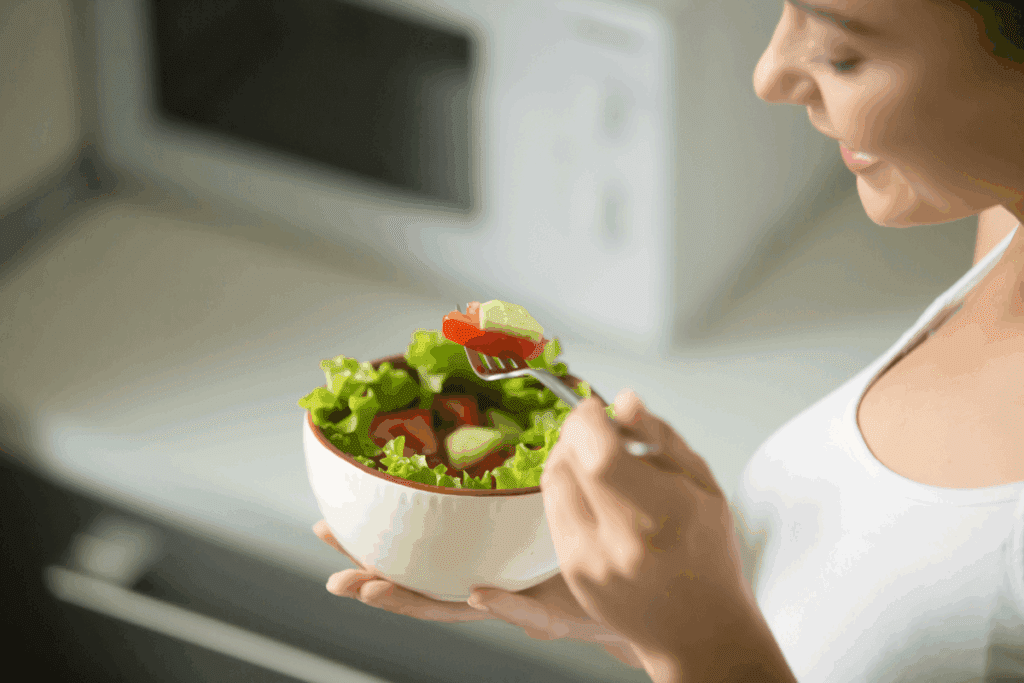
A healthy diet is key to keeping your gallbladder in good shape. Knowing this helps prevent gallbladder problems. The gallbladder plays a big role in digestion, storing bile from the liver.
The gallbladder stores and concentrates bile for fat digestion in the small intestine. Eating too much of certain fats can make the gallbladder work harder. This can cause problems if the gallbladder isn’t working right.
How Poor Diet Choices Lead to Gallstones
Bad diet choices can increase your risk of gallstones. Eating lots of refined sugars and saturated fats can lead to gallstones. Studies show that a diet low in fiber and healthy fats also raises gallstone risk. This is because such diets can change bile’s makeup, making it more likely to form stones.
Also, a diet full of processed foods and lacking in nutrients can harm the gallbladder. Not enough omega-3 fatty acids, found in fish and nuts, can cause inflammation. But, foods high in monounsaturated fats, like olive oil, can help keep the gallbladder healthy.
Research on Diet and Gallbladder Disease Prevention
Many studies have looked into how diet affects gallbladder disease. They found that eating lots of fruits, vegetables, and whole grains can prevent gallbladder disease. These foods are full of fiber and antioxidants that help reduce inflammation and improve gallbladder health.
Some nutrients are good for the gallbladder too. Omega-3 fatty acids, found in fish and nuts, have anti-inflammatory effects. Vitamin C, in citrus fruits and leafy greens, helps with bile acid metabolism, which can lower gallstone risk.
By choosing the right foods, we can lower our risk of gallbladder problems. Knowing how diet affects gallbladder health helps us stay proactive about keeping our gallbladder healthy.
7 High-Fat Foods to Avoid for Gallbladder Health
To keep your gallbladder healthy, it’s key to know which high-fat foods to steer clear of. Foods high in saturated fats can up the risk of gallbladder issues, like gallstones. By cutting down or avoiding these foods, you can help manage your gallbladder health better and lower the chance of complications.
Fried Foods and Fast Food
Fried foods and fast food are loaded with unhealthy fats that can lead to gallbladder attacks. Foods like french fries, fried chicken, and processed fast food meals are not just high in fat but also low in good nutrients. Avoiding these can greatly ease the burden on your gallbladder.
Fatty Cuts of Meat
Fatty cuts of meat, like ribeye steak and pork belly, are packed with saturated fats. These meats can be tough on people with gallbladder problems because they need more bile for digestion, which can cause pain. Choosing leaner cuts can help lessen this risk.
Full-Fat Dairy Products
Full-fat dairy items, like cheese, whole milk, and cream, are high in saturated fats. While they can fit into a balanced diet, people with gallbladder issues might need to cut back to avoid worsening symptoms. Going for low-fat or fat-free options is a healthier choice.
Processed Meats
Processed meats, such as sausages and bacon, are not just high in fat but also in sodium and preservatives. These foods can be hard on the gallbladder, so it’s best to eat them sparingly or skip them. Picking lean, unprocessed proteins is generally better for gallbladder health.
By being careful about these high-fat foods and making smart food choices, you can make big strides in keeping your gallbladder healthy and improving your overall health.
4 Processed Foods That Trigger Gallbladder Pain
Processed foods can cause gallbladder pain. Knowing which ones to avoid is key for gallbladder health. The gallbladder is sensitive and can react to certain foods, like processed ones. Avoiding these foods can lower the risk of gallbladder pain.
Refined Carbohydrates and White Flour Products
Refined carbs and white flour products can trigger gallbladder pain. They lack fiber and nutrients, causing digestive issues. Eating too much of these can increase gallstone risk and other gallbladder problems.
Limit or avoid white bread, pastries, and many packaged snacks. Choose whole grains instead. They are full of fiber and nutrients, helping gallbladder health.
Sugary Foods and Beverages
Sugary foods and drinks can also cause gallbladder pain. High sugar intake can cause inflammation and increase gallbladder disease risk. Drinks like soda and sports drinks are bad because they’re full of sugar and lack nutrients.
“A diet high in sugar can lead to an increased risk of gallbladder disease, making it essential to limit sugary foods and beverages.”
Artificial Sweeteners and Additives
Artificial sweeteners and additives in processed foods can also cause gallbladder pain. Some artificial sweeteners are hard to digest, causing stomach issues. Always check food labels and avoid products with artificial sweeteners and additives.
| Processed Food Category | Examples | Healthier Alternatives |
| Refined Carbohydrates | White bread, pastries | Whole grain bread, oat biscuits |
| Sugary Foods and Beverages | Soda, sports drinks, candy | Water, unsweetened tea, fruit |
| Artificial Sweeteners and Additives | Diet soda, sugar-free gum, processed snacks | Natural sweeteners like honey, unsweetened products |
Being aware of these foods and making smart food choices can help avoid gallbladder pain. It supports overall gallbladder health.
4 Surprising Foods That May Cause Gallbladder Issues
Keeping your gallbladder healthy means knowing which foods to avoid and which might surprise you. Some foods thought to be good for you can actually cause problems. Knowing these foods can help you manage symptoms and keep your gallbladder in good shape.
High-Fat Plant Foods (Nuts, Avocados)
Nuts and avocados are usually seen as healthy because of their nutrients. But, their fat content can be a problem for people with gallbladder issues. The gallbladder helps digest fats, and eating too much can make it work too hard, leading to pain.
Nuts: Nuts are full of healthy fats and protein, but they’re hard on the gallbladder. Almonds, walnuts, and pecans are good for you, but eat them in small amounts if you have gallbladder problems.
Avocados: Avocados are packed with healthy fats and fiber, but they can also be tough on the gallbladder. Their fat content can make the gallbladder contract too much, which can worsen symptoms for those with gallbladder disease.
Eggs
Eggs are a problem for people with gallbladder issues. They’re high in fat, and the fat in the yolk can make the gallbladder work too hard. This can cause discomfort or pain.
| Food | Fat Content (approx.) | Impact on Gallbladder |
| Egg Yolk (1 large) | 5g | Can stimulate gallbladder contractions |
| Egg White (1 large) | 0g | Generally safe for gallbladder health |
Chocolate and Caffeine
Chocolate and caffeine can also cause gallbladder problems. Both can make the gallbladder contract, leading to pain or discomfort.
Chocolate: Chocolate has a lot of fat, which can make the gallbladder work too hard. It also has compounds that can relax the sphincter of Oddi, letting bile flow into the stomach and causing discomfort.
Caffeine: Caffeine can make the gallbladder contract, which can be painful for people with gallstones or other gallbladder problems. While most people can safely have some caffeine, those with gallbladder issues should be careful.
Good Food for Gallbladder: Fiber-Rich Options
A diet rich in fiber is key for a healthy gallbladder. Fiber helps lower inflammation and boosts digestive health. This can stop gallbladder problems.
Fruits That Support Gallbladder Health
Fruits are full of fiber and antioxidants. Berries, apples, and pears are great for gallbladder health. They’re not just high in fiber but also have anti-inflammatory compounds.
Top Fruits for Gallbladder Health:
- Apples
- Berries (strawberries, blueberries, raspberries)
- Pears
- Peaches
Vegetables That Reduce Gallbladder Inflammation
Vegetables are vital for a gallbladder-friendly diet. Leafy greens, cruciferous veggies, and root veggies are best. They’re packed with fiber, vitamins, and minerals that fight inflammation and support digestion.
Top Vegetables for Gallbladder Health:
- Leafy greens (spinach, kale)
- Cruciferous vegetables (broccoli, cauliflower)
- Root vegetables (carrots, beets)
Whole Grains for Digestive Health
Whole grains are full of dietary fiber, essential for a healthy gut. Foods like brown rice, quinoa, and whole-wheat bread help keep bowel movements regular. They also lower the chance of gallstones.
| Whole Grain | Fiber Content (per serving) | Benefits for Gallbladder Health |
| Brown Rice | 3.5 grams | Rich in fiber, helps regulate bowel movements |
| Quinoa | 5.2 grams | High in fiber and protein, supports digestive health |
| Whole-wheat Bread | 4.4 grams | Rich in fiber, helps reduce the risk of gallstones |
Eating more fruits, veggies, and whole grains can greatly improve gallbladder health. These foods reduce inflammation, support digestion, and prevent gallbladder problems.
Lean Proteins That Won’t Stress Your Gallbladder
Lean proteins are key for a diet that’s good for your gallbladder. They help build health without stressing your gallbladder. It’s smart to mix different lean proteins into your meals for better gallbladder health.
Fish and Omega-3 Benefits
Fatty fish like salmon, mackerel, and sardines are lean and full of omega-3s. These fats fight inflammation in the gallbladder. They also boost digestive health, making fish a top pick for gallbladder health.
Skinless Poultry Options
Skinless chicken and turkey are great lean proteins. Without skin, they have less fat, which is better for your gallbladder. They also pack vitamins and minerals for your overall health.
Plant-Based Protein Sources
For plant-based fans, legumes, tofu, and tempeh are top picks. They’re easy on the gallbladder and full of fiber for better digestion. Adding these to your diet keeps it balanced and healthy.
Choosing lean proteins helps those with gallbladder issues eat well without pain. It’s about making smart food choices for your health.
Healthy Fats That Support Gallbladder Function
Healthy fats are key for a healthy gallbladder and digestion. A low-fat diet can help with gallbladder problems. But, not all fats are the same. Some fats, like essential fatty acids, are very important for gallbladder health.
Olive Oil and Other Beneficial Oils
Olive oil is known for its health benefits, including for the gallbladder. It has monounsaturated fats that help the gallbladder work better. Other good oils include:
- Avocado Oil: Like olive oil, avocado oil has healthy fats that are good for the gallbladder.
- Coconut Oil: Coconut oil has saturated fats, but it also has MCTs. These are easy to digest and don’t strain the gallbladder.
- Flaxseed Oil: Flaxseed oil is full of omega-3s. It’s good for overall health and helps with a balanced diet for the gallbladder.
It’s important to use these oils in small amounts. They are high in calories, but they are good for you.
Foods Rich in Essential Fatty Acids
Some foods are also good for the gallbladder because they have essential fatty acids. These include:
- Fatty Fish: Salmon, mackerel, and sardines are full of omega-3s. They’re also good for the heart and can reduce inflammation.
- Nuts and Seeds: Almonds, walnuts, chia seeds, and flaxseeds are great sources of healthy fats. They’re easy to add to your diet.
- Avocados: Avocados are high in fat, but it’s the good kind. They support digestion and gallbladder health.
Eating these foods can help your gallbladder work better. They give your gallbladder the fats it needs without upsetting your stomach.
What to Eat During a Gallbladder Attack
When you have a gallbladder attack, changing your diet is key. The right foods can ease your pain and help you heal.
Clear Liquid Diet Options
Start with a clear liquid diet during an attack. It’s gentle on your gallbladder and digestive system. These liquids are easy to digest and keep you hydrated.
Some clear liquids include:
- Water
- Clear broths (chicken or vegetable)
- Electrolyte-rich beverages (like coconut water or sports drinks)
- Herbal teas (peppermint or chamomile)
Table: Examples of Clear Liquid Diet Options
| Liquid | Benefits |
| Water | Hydrates the body |
| Clear Broth | Provides essential salts |
| Coconut Water | Replenishes electrolytes |
Gradually Reintroducing Solid Foods
When you feel better, slowly add solid foods back into your diet. Start with small amounts of bland foods. Watch how your body reacts.
Good first foods include:
- Bland fruits (bananas, applesauce)
- Plain toast or crackers
- Plain rice or oatmeal
- Lean proteins (cooked chicken or fish)
Hydration and Gallbladder Health
Drinking enough water is vital for your gallbladder, even during an attack. It helps prevent gallstones and aids digestion.
Drink lots of water all day. Herbal teas or clear broths are good too. But avoid caffeinated and alcoholic drinks as they dry you out.
By eating right during a gallbladder attack, you can feel better faster. Always talk to a doctor for advice that fits you.
Creating a Balanced Gallbladder-Friendly Meal Plan
To keep your gallbladder healthy, it’s key to plan meals that are both nutritious and easy on your stomach. A good gallbladder-friendly meal plan can boost your digestive health. It does this by adding foods that help your gallbladder and avoiding those that might cause problems.
Sample Daily Menu
When making a daily menu for gallbladder health, pick foods that are easy to digest and full of nutrients. Here’s a sample daily menu to guide you:
| Meal | Foods | Benefits |
| Breakfast | Oatmeal with fruits and nuts | High in fiber, gentle on the digestive system |
| Lunch | Grilled chicken with quinoa and steamed vegetables | Lean protein, complex carbohydrates, and fiber-rich vegetables |
| Dinner | Baked salmon with brown rice and sautéed spinach | Rich in omega-3 fatty acids, fiber, and antioxidants |
| Snacks | Fresh fruits, carrot sticks with hummus | Low in fat, high in fiber and vitamins |
Tips for Dining Out with Gallbladder Issues
Dining out can be tough with gallbladder problems, but with some planning, you can enjoy meals out without discomfort. Here are some tips:
- Choose restaurants with healthy options: Opt for places that offer grilled, baked, or steamed dishes.
- Avoid high-fat foods: Steer clear of fried foods, fatty meats, and rich sauces.
- Be mindful of portion sizes: Eating smaller portions can help manage symptoms.
- Stay hydrated: Drink plenty of water to help with digestion.
By following these guidelines and being mindful of your food choices, you can create a gallbladder-friendly meal plan. This plan supports your overall health and well-being.
Conclusion: Long-Term Dietary Strategies for Gallbladder Health
Keeping your gallbladder healthy means sticking to good eating habits for the long haul. Eating well can lower your chance of gallbladder problems and boost your overall health. A balanced diet with fiber, lean proteins, and healthy fats is key. It helps your gallbladder work right and keeps your digestive system healthy.
It’s also important to stay away from foods high in fat and processed foods. These can cause gallbladder pain. Choosing the right foods can help manage your gallbladder health. Adding whole grains, fruits, and veggies to your diet is a good start.
Combining good eating with a healthy lifestyle can cut down your risk of gallbladder disease. It keeps your digestive system in top shape. We suggest talking to a healthcare pro to create a meal plan that fits your needs. This will help keep your gallbladder healthy for the long term.
FAQ
What is a healthy gallbladder diet?
A healthy gallbladder diet is full of fiber and low in saturated fats. It includes lean proteins, fruits, vegetables, and whole grains. These foods help keep your gallbladder healthy and reduce pain.
What foods should I avoid with gallbladder issues?
Avoid high-fat foods like fried foods and fatty meats. Also, stay away from full-fat dairy and processed meats. Refined carbs, sugary foods, and artificial sweeteners are also bad for your gallbladder.
Are there any healthy foods that can cause gallbladder issues?
Yes, some healthy foods can cause problems. High-fat plant foods, eggs, chocolate, and caffeine can trigger issues in some people.
What are some good foods for gallbladder health?
Foods high in fiber like fruits, vegetables, and whole grains are good. Lean proteins like fish and plant-based options also support gallbladder health.
What are some healthy fats that support gallbladder function?
Healthy fats like olive oil and essential fatty acids are good for your gallbladder. They help with digestion and overall health.
What should I eat during a gallbladder attack?
During an attack, eat a clear liquid diet first. Then, slowly add solid foods. Stay hydrated to help your gallbladder.
How can I create a balanced gallbladder-friendly meal plan?
To make a balanced meal plan, choose the right foods. Be mindful of your diet. Plan meals with gallbladder-friendly options.
What are some tips for dining out with gallbladder issues?
When eating out, pick restaurants with healthy options. Avoid high-fat and processed foods. Watch your portion sizes to keep your gallbladder healthy.
Can dietary changes help manage gallbladder health?
Yes, making long-term dietary changes can help. Choose healthy foods and maintain good eating habits. This reduces gallbladder issues and improves overall health.
What is the role of the gallbladder in digestion?
The gallbladder stores bile to break down fats. Eating fiber-rich foods and avoiding saturated fats supports its function.
References:
Pietrangelo, A. (2024). Managing weight loss after gallbladder removal. Medical News Today. Retrieved from https://www.medicalnewstoday.com/articles/317659









